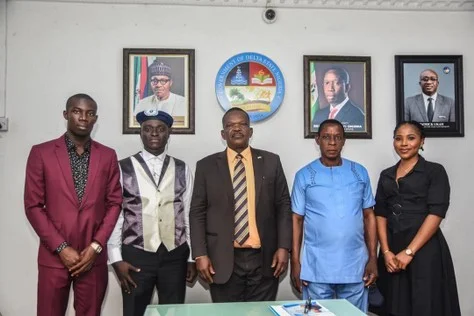Crime Prevention: IHRC Meets Delta State Government, Solidify Cooperation
Missions > Actions > Crime Prevention Education
Crime Prevention: IHRC Meets Delta State Government, Solidify Cooperation
In continuation of effective consultations to share insights and ascertain the role of partnership between the Transnational Intergovernmental Organization-the International Human Rights Commission (IHRC) and government agencies in the implementation of the Crime Prevention Education and Anti-Social Behavior Campaign for Tertiary Institutions in Delta State, the Special Monitoring Mission of the International Human Rights Commission (SMM IHRC) in Delta State on Monday 4th July paid a courtesy visit to the Secretary to the State Government (SSG), Hon. Patrick Ukah at Government House Asaba.


The visit was led by the IHRC Editor-in-Chief for African Countries and Regional Volunteers Coordinator South-South Region Nigeria Amb. Fidelis Onakpoma, alongside SMM IHRC Officials; Comr. Joseph Yusuf, Barr. Elizabeth Ekwerekwu, Rev. Francis Ineh, and Gideon Oghenefevwe.
While conveying the compliments
of the IHRC Secretary-General Prof. h.c. Rafal Marcin Wasik, Fidelis Onakpoma appreciated the SSG and the Delta State Government for indicating interest in the Project, stating that the Project is a planned effort that seeks to reduce the risk of crime occurrence and their potentially harmful effects on individuals, and society; providing guidelines for crime prevention and anti-social behaviors by creating distinct campaigns that educate young people and instill moral values.
“It was initiated in recognition of the United Nations Doha Declaration adopted at the 13th Congress on Crime Prevention and Criminal Justice, enshrined to improve awareness for children and youth to prevent crime, terrorism, and corruption and promote sustainable development; strengthening judicial integrity and preventing corruption in the justice system; fostering prisoner rehabilitation and social reintegration; and preventing youth crime through sports", he added.
He decried that the Nigerian society has been witnessing insecurity, ethical decline and moral crisis as moral values which were hitherto cherished are degenerating. Citizens of the country are becoming violent, crime vulnerable, materialistic, drug prone, sexually promiscuous, evil-minded, and greedy.
Expressing the readiness of the International Human Rights Commission in the global fight against crime and other social vices, we must come together to find ways to engage as directly and forcefully as possible, strengthen the approaches that work, chart new paths and sustain new partnerships in transforming policy into action.
He maintained that the role of the Delta State Government in the Project Implementation is to intensify and modify partnering strategies with Tertiary Institutions and other government ministries and stakeholders in the State, and to ensure the project sustainability.
To further uphold the Doha Declaration of the United Nations Office on Drug and Crime (UNODC) in the State, he urged the Government to work to minimize the challenge of criminal justice and discuss the need for a changed narrative and active engagement with the judiciary, stressing that stakeholders which are highly knowledgeable technocrats and skilled professionals needed to show greater interest in partnership with this Project to deepen quality impact within the international community amongst others.
He noted that IHRC and the Delta State University Abraka (DELSU) have reached an alliance to collaborate in the first phase of the project implementation taking place at the Institution on August 2nd and 3rd 2022 precisely.
In response, the Permanent Secretary to the SSG who represented the SSG appreciated the International Human Rights Commission for such a laudable intervention project designed for tertiary institutions in Delta State. Owing to the insecurities and other disturbing situations faced by Nigerians, the need for the project cannot be thrown overboard, the PS averred.
He reaffirmed the unwavering commitments of the Government to join hands in the project implementation noting that there would be a need to extend the project to Post-Primary Schools.
Reported:
Amb. Engr. Elijah Vitus Echendu.
IHRC National Volunteers Coordinator, Nigeria
Editorial:
Fidelis Onakpoma
IHRC Editor-in-Chief for African Countries.



